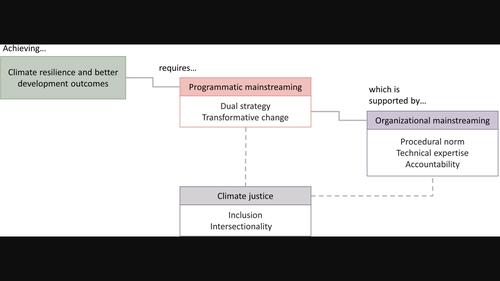当前位置:
X-MOL 学术
›
WIREs Clim. Chang.
›
论文详情
Our official English website, www.x-mol.net, welcomes your
feedback! (Note: you will need to create a separate account there.)
Greener through gender: What climate mainstreaming can learn from gender mainstreaming
WIREs Climate Change ( IF 9.4 ) Pub Date : 2024-04-10 , DOI: 10.1002/wcc.887 Steven Lam 1, 2 , Gloria Novović 3 , Kelly Skinner 4 , Hung Nguyen‐Viet 2
WIREs Climate Change ( IF 9.4 ) Pub Date : 2024-04-10 , DOI: 10.1002/wcc.887 Steven Lam 1, 2 , Gloria Novović 3 , Kelly Skinner 4 , Hung Nguyen‐Viet 2
Affiliation

|
Addressing the urgent global climate crisis demands a rapid and meaningful expansion of “climate mainstreaming,” which refers to the integration of climate objectives in all aspects of development programs and policies. However, progress remains slow and uneven due to bottlenecks in policy and institutional change. Considering the parallel struggle recorded over decades to mainstream gender across the same policy arenas, a key question emerges: what can climate mainstreaming learn from gender mainstreaming? To answer this question, we review 57 policy, strategy, and guidance documents of United Nations agencies, all of which integrate these themes into food security and broader development programming. Our analysis identifies gaps in climate mainstreaming efforts and derives lessons from gender mainstreaming to bridge these gaps. It underscores the importance of adapting programmatic mainstreaming strategies in response to evolving contexts, for example, by simultaneously considering both mainstreaming and targeted interventions. Additionally, it highlights the need to adopt organizational climate mainstreaming and establish mechanisms for accountability. Finally, it emphasizes the urgency of embracing a climate justice lens; in practice, this involves prioritizing populations at greater risk of climate change impacts and actively engaging diverse perspectives in decision‐making, particularly communities facing multiple forms of discrimination.This article is categorized under: Integrated Assessment of Climate Change > Assessing Climate Change in the Context of Other Issues Climate and Development > Sustainability and Human Well‐Being Policy and Governance > International Policy Framework
中文翻译:

通过性别实现绿色:气候主流化可以从性别主流化中学到什么
解决紧迫的全球气候危机需要迅速、有意义地扩大“气候主流化”,即将气候目标纳入发展计划和政策的各个方面。然而,由于政策和制度变革的瓶颈,进展仍然缓慢且不平衡。考虑到几十年来在同一政策领域为性别主流化而进行的平行斗争,一个关键问题出现了:气候主流化可以从性别主流化中学到什么?为了回答这个问题,我们回顾了联合国机构的 57 份政策、战略和指导文件,所有这些文件都将这些主题纳入粮食安全和更广泛的发展规划中。我们的分析确定了气候主流化工作中的差距,并从性别主流化中吸取经验教训来弥补这些差距。它强调了根据不断变化的情况调整方案主流化战略的重要性,例如,同时考虑主流化和有针对性的干预措施。此外,它还强调需要采用组织氛围主流化并建立问责机制。最后,它强调了拥抱气候正义视角的紧迫性;在实践中,这涉及优先考虑受气候变化影响风险较大的人群,并在决策中积极吸收不同的观点,特别是面临多种形式歧视的社区。本文分类如下: 气候变化综合评估 > 在其他问题的背景下评估气候变化 气候与发展 > 可持续发展与人类福祉 政策与治理 > 国际政策框架
更新日期:2024-04-10
中文翻译:

通过性别实现绿色:气候主流化可以从性别主流化中学到什么
解决紧迫的全球气候危机需要迅速、有意义地扩大“气候主流化”,即将气候目标纳入发展计划和政策的各个方面。然而,由于政策和制度变革的瓶颈,进展仍然缓慢且不平衡。考虑到几十年来在同一政策领域为性别主流化而进行的平行斗争,一个关键问题出现了:气候主流化可以从性别主流化中学到什么?为了回答这个问题,我们回顾了联合国机构的 57 份政策、战略和指导文件,所有这些文件都将这些主题纳入粮食安全和更广泛的发展规划中。我们的分析确定了气候主流化工作中的差距,并从性别主流化中吸取经验教训来弥补这些差距。它强调了根据不断变化的情况调整方案主流化战略的重要性,例如,同时考虑主流化和有针对性的干预措施。此外,它还强调需要采用组织氛围主流化并建立问责机制。最后,它强调了拥抱气候正义视角的紧迫性;在实践中,这涉及优先考虑受气候变化影响风险较大的人群,并在决策中积极吸收不同的观点,特别是面临多种形式歧视的社区。本文分类如下:




















































 京公网安备 11010802027423号
京公网安备 11010802027423号